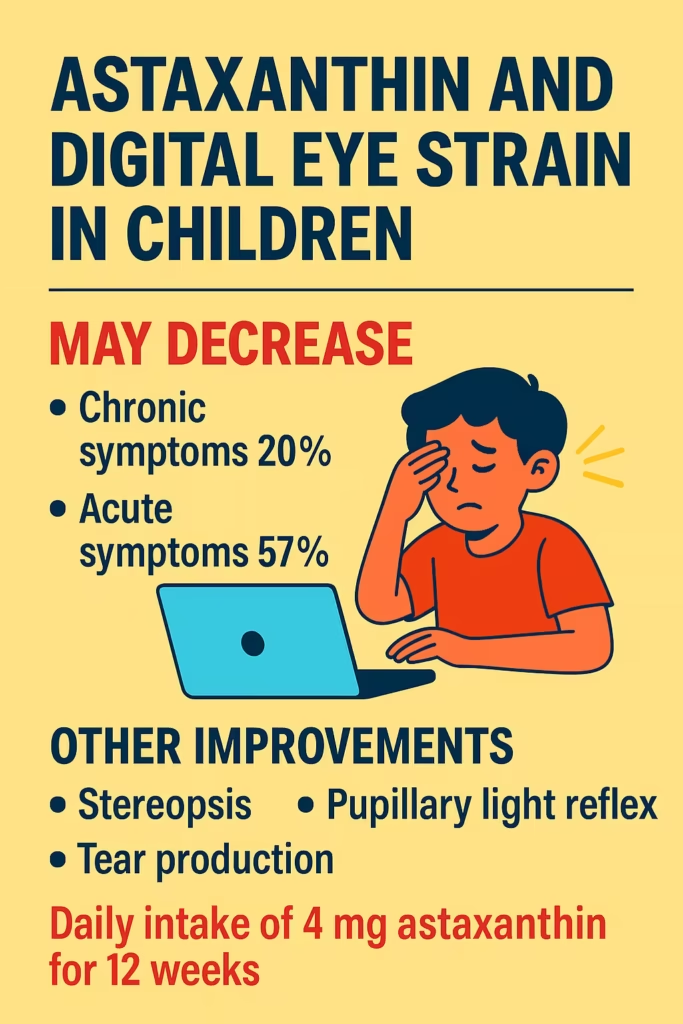Astaxanthin Significantly Reduces Digital Eye Strain in Children, Study Finds
A recent clinical study, published in Advances in Therapy, has demonstrated that daily supplementation with astaxanthin can significantly reduce symptoms of digital eye strain—also referred to as computer vision syndrome (CVS)—in children. After 12 weeks of supplementation, children who took astaxanthin reported 20% fewer chronic symptoms and 57% fewer acute symptoms compared to those who received a placebo.
The study was led by Dr. Karen A. Hecht, Vice President of Science at AstaReal, who noted that the growing concern around the effects of prolonged screen exposure in children is still not fully understood. Issues such as myopia progression, learning difficulties, mood disturbances, and disrupted sleep have all been associated with digital eye strain, yet little research had focused on this condition in younger populations until now. Although astaxanthin has previously been shown to alleviate eye strain in adults, this is the first investigation into its effectiveness in children.
Study Design and Methodology
The research team conducted a randomized, double-masked, placebo-controlled trial involving 64 children aged 10 to 14. All participants had used digital devices for at least four hours per day over the previous three months and were experiencing mild to moderate symptoms of digital eye strain. These symptoms were measured using the Computer Vision Syndrome Questionnaire (CVS-Q).
The participants were evenly divided into two groups:
- One group received a 4 mg soft gel capsule of astaxanthin daily.
- The other group received a placebo capsule.
This treatment regimen continued for 84 days (12 weeks). The primary goal of the study was to assess changes in CVS symptoms based on CVS-Q scores over time.
Findings and Timeline of Improvements
At the start of the trial, both groups had similar baseline scores on the CVS-Q, indicating no significant differences in symptoms. However, by day 14, the group taking astaxanthin already showed a statistically significant improvement, with their CVS-Q scores decreasing by an average of –0.71 ± 1.87 arbitrary units, compared to a –0.03 ± 0.97 change in the placebo group.
Dr. Hecht emphasized that the rapid onset of symptom relief was especially notable. Unlike other eye health supplements such as lutein and zeaxanthin, which typically require 6 to 9 months to show effects due to slow accumulation in the eye’s macula, astaxanthin may act through a different biological pathway. Specifically, astaxanthin is known to deposit in the ciliary body, a structure at the front of the eye involved in focusing.
By the end of the 12-week period (day 84), the difference between the two groups had further widened. The average reduction in CVS-Q score was 4 ± 4.05 in the astaxanthin group, compared to 1.72 ± 3.61 in the placebo group.
Secondary Outcomes and Additional Benefits
In addition to reducing eye strain symptoms, children taking astaxanthin also experienced improvements in several secondary visual and physiological measures:
- Stereopsis (depth perception) improved significantly at days 28 and 84 after one hour of screen time, when compared to placebo.
- Pupillary light reflex—an indicator of how well the eye responds to changes in light—showed meaningful improvement by day 84 in the astaxanthin group.
- Tear production, an important factor in maintaining eye comfort and preventing dryness, was noticeably increased at days 14, 56, and 84 in comparison to baseline levels.
These findings suggest that astaxanthin may not only alleviate the discomfort associated with prolonged screen exposure but also enhance certain aspects of visual performance.
Conclusion and Future Directions
Based on the results, the research team concluded that a daily dose of 4 mg of astaxanthin is a potentially effective treatment for both chronic and acute symptoms of computer vision syndrome in school-aged children. The improvements seen in stereopsis, reflex responses, and tear production also indicate broader benefits for overall eye health during prolonged digital use.
Dr. Hecht recommended that future research explore astaxanthin’s long-term effects on more complex and developmental outcomes associated with digital screen use, such as:
- Progression of myopia (nearsightedness)
- Learning and cognitive performance
- Emotional regulation and mood
- Quality of sleep
Disclosures
Dr. Karen Hecht is affiliated with AstaReal, the company that produces the astaxanthin supplement used in the study. Additional financial disclosures from other authors are available in the full publication.
Let me know if you’d like this version turned into a handout, infographic, or simplified summary for parents or school health professionals.



